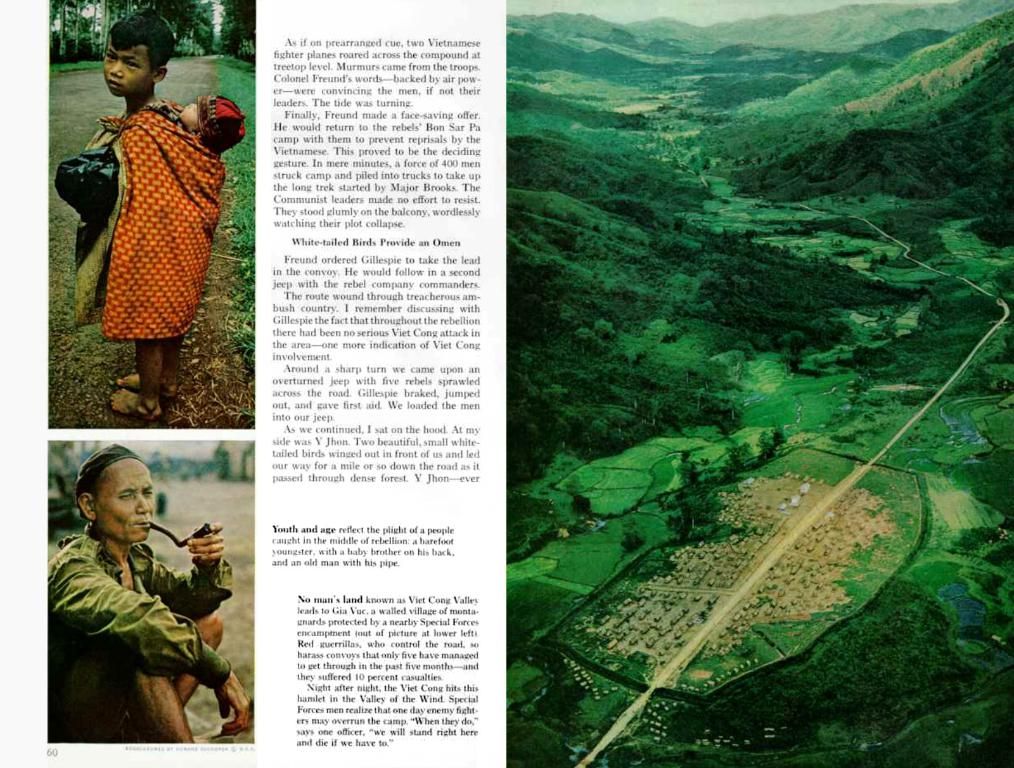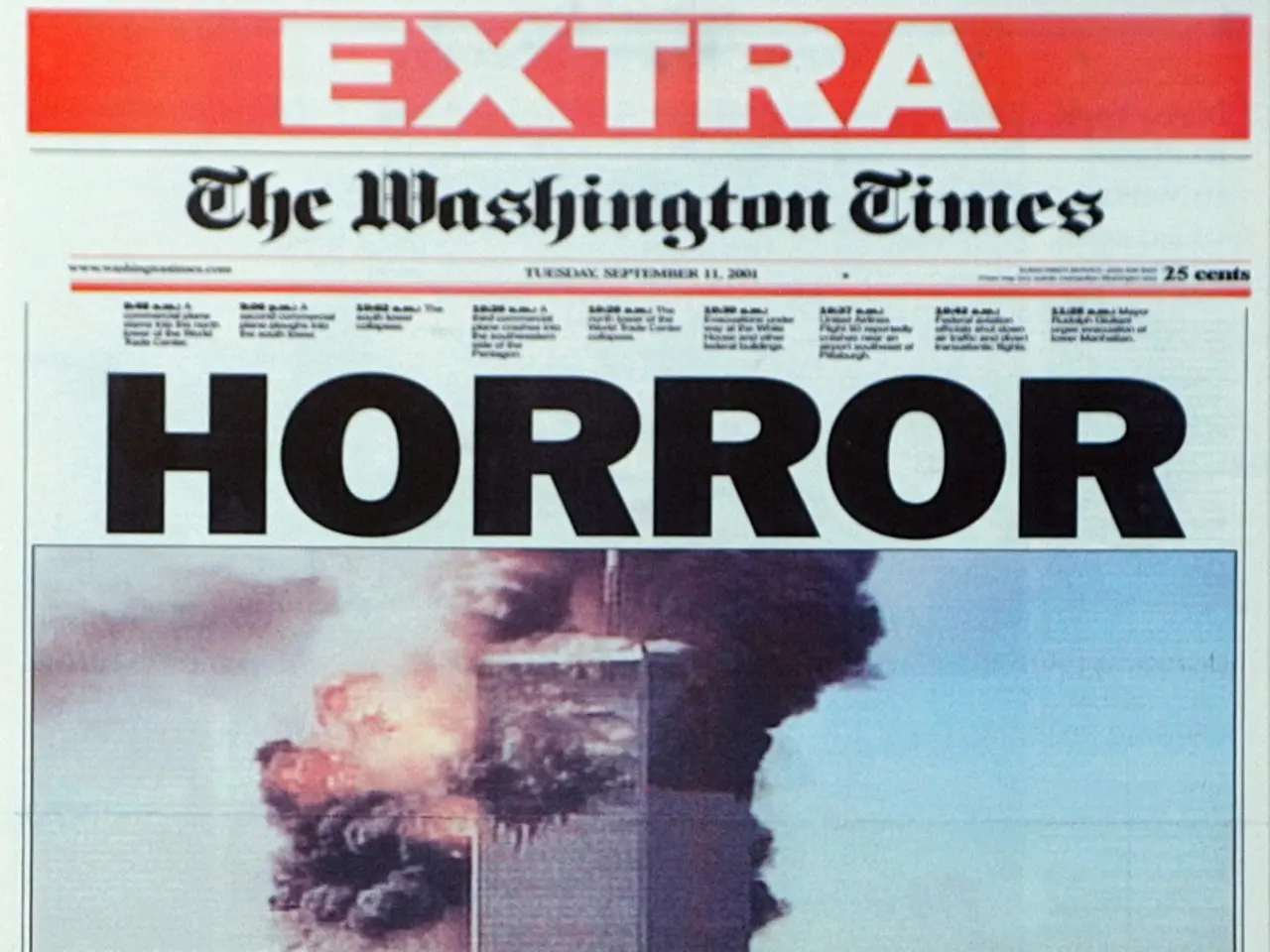Guiding America Through Turbulent Times: Franklin D. Roosevelt's Leadership During Crises
Take a gander at the life and times of Franklin D. Roosevelt, the one-of-a-kind president who left an indelible mark on American politics and history. Born on January 30, 1882, in Hyde Park, New York, FDR was raised in a rich family with big dreams for a career in law and politics. After battling polio at 39 and ending up paralyzed from the waist down, FDR's political ambitions still skyrocketed. He became the 32nd President of the United States, serving a record-breaking four terms from 1933 to 1945.
FDR tackled two of the most tumultuous periods in American history, the Great Depression and World War II, leaving no doubt about his status as a groundbreaking leader. His leadership introduced revolutionary policies and programs that forever altered the American political and social landscape. New Deal reforms aimed to breathe life back into the U.S. economy drained by the Great Depression**. These reforms provided relief, recovery, and reform, equipping the struggling with aid, reinvigorating the economy, and implementing reforms to prevent future calamities.
Critical aspects of FDR's New Deal included the Civilian Conservation Corps (CCC), the Public Works Administration (PWA), and the Social Security Act, which offered jobs, support, and infrastructure funding to boost the economy. To tame the agricultural industry, the Agricultural Adjustment Act (AAA) aimed to stabilize agricultural prices and aid farmers. Crucially, banking reforms like the Emergency Banking Act and the Federal Deposit Insurance Corporation (FDIC) helped restore public faith in the financial system, eventually paving the way for economic recovery.
As Europe plunged into World War II in 1939, FDR initially adhered to a stance of neutrality. However, as the war intensified and threatened global stability, FDR recognized the need for U.S. involvement. The Lend-Lease Act of 1941 marked a turning point, allowing the U.S. to supply arms and support to Allied nations, particularly Great Britain and the Soviet Union. The attack on Pearl Harbor on December 7, 1941, brought the U.S. into the war, with FDR leading the nation with confidence. Under his leadership, the U.S. mobilized its impressive economic and industrial resources to support the war effort, establishing itself as a key force in the Allied victory and cementing America's place as a global superpower.
FDR's diplomatic prowess was equally vital. He played a crucial role in wartime conferences, such as Tehran, Yalta, and Casablanca, forging alliances and strategizing for a post-war world. His vision for international cooperation laid the groundwork for establishing the United Nations, aiming to prevent future conflicts and foster global peace and stability. FDR's tenure thus signaled a shift from isolationism to internationalism in American foreign policy.
The New Deal fundamentally reshaped America's political and economic landscape, leaving a lasting legacy that resonates in contemporary society. FDR's policies set the stage for the modern welfare state, establishing government responsibility for citizens' economic security and wellbeing. Programs such as Social Security, unemployment insurance, and federal housing initiatives served as the foundation for current social welfare policies. Labor protections, like those enshrined in the Wagner Act, empowered workers, contributed to the rise of the American middle class, and bolstered the labor movement.
Moreover, the New Deal's emphasis on infrastructure and public works projects set a precedent for federal investment in critical projects, significantly impacting the nation's physical and economic development. The Tennessee Valley Authority (TVA) and the Rural Electrification Administration brought electricity and modernization to rural areas, enhancing the quality of life and economic opportunities.
While the New Deal faced pushback, particularly from business leaders and conservatives, its effect on the nation's recovery from the Great Depression was undeniable. It also radically shifted the political landscape, fostering Democratic dominance and redefining the role of the federal government in tackling economic and social challenges.
FDR's leadership style blended optimism, pragmatism, and experimentation. His ability to communicate effectively with the American public through his famous "fireside chats" created a sense of connection and trust. Surrounding himself with diverse advisors and fostering a collaborative approach enabled him to navigate complex challenges seamlessly. His charismatic, empathetic demeanor end endeared him to many, bolstering his popularity even during trying times.
Despite the controversies, such as concerns about the expansion of executive power and his handling of certain issues, like the internment of Japanese Americans during World War II, FDR's legacy as a transformative leader remains firmly established. His presidency epitomized strong, visionary leadership capable of overcoming formidable obstacles and driving significant change.
In conclusion, the life of Franklin D. Roosevelt offers valuable insights into the role of leadership in guiding a nation's path. FDR's tenure, marked by the hardships of the Great Depression and World War II, demonstrated the power of resilient, empathetic leadership in leading the nation through economic despair and global conflict.
FDR's New Deal policies set the stage for the modern welfare state, establishing a framework for economic security and social welfare that persists today. His diplomatic acumen during World War II solidified America's position as a global leader, laying the groundwork for post-war prosperity and the establishment of international institutions aimed at promoting peace and cooperation.
As a political pioneer, FDR's contributions to American society and international affairs cannot be overstated. His legacy serves as a testament to the potential of determined and compassionate leadership in addressing economic, social, and international challenges. For students of history and social studies, the life of Franklin D. Roosevelt presents a compelling case study in the impact of visionary leadership on the course of a nation and the wider world.
- Franklin D. Roosevelt's economic policy, such as the New Deal, significantly influenced American history, establishing government intervention as a key component in addressing economic crises and providing a framework for modern welfare state policies.
- In response to the tumultuous periods of the Great Depression and World War II, FDR, through his legislative initiatives like the Lend-Lease Act, the Social Security Act, the Emergency Banking Act, and the Tennessee Valley Authority, introduced groundbreaking policy- and legislation-based solutions that shaped the political and social landscape.
- Significant components of FDR's New Deal included the Civilian Conservation Corps, the Public Works Administration, the Social Security Act, the Agricultural Adjustment Act, and the Federal Deposit Insurance Corporation, all aimed at providing employment, supporting citizens, and stabilizing various industries in the context of war-and-conflicts and economic policy.
- FDR's diplomatic efforts during World War II, expressed in international conferences like Tehran, Yalta, and Casablanca, laid the foundations for establishing the United Nations, demonstrating a shift in American foreign policy from isolationism to internationalism in line with politics and general-news issues of the era.








